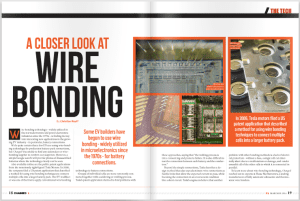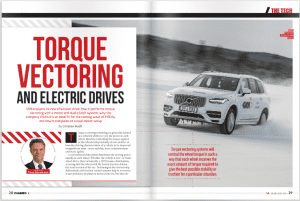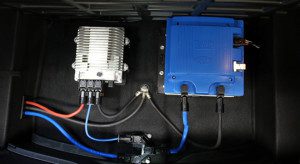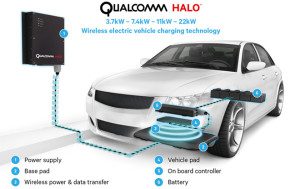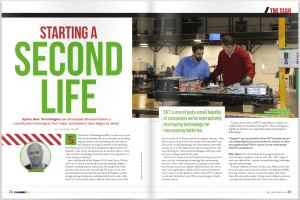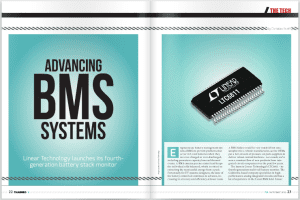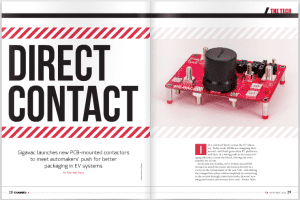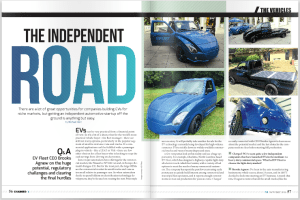Momentum Dynamics says it will deliver 200 kW wireless charging systems for the municipal bus market in 2016. According to CEO Andrew Daga, the company delivered 25 kW and 50 kW systems to partners in the automotive industry in 2015, and is planning to deliver two wireless systems to municipal agencies in Maryland and Washington… Read more »
Search Results Found For: "Motiv Power Systems"
A closer look at wire bonding
Wire bonding technology – widely utilized in the microelectronics and power electronics industries since the 1970s – is finding its way into interesting new applications in the growing EV industry – in particular, battery connections. We’re quite certain that a few EVs are using wire-bonding technology for production battery pack connections, but Charged was unable… Read more »
Electric torque vectoring: Q&A with GKN’s Advanced Engineering Director (Full Interview)
Torque vectoring technology is generally defined as a vehicle’s ability to vary the power to each wheel. Quickly controlling the torque applied to the wheels independently of one another allows the driving characteristics of a vehicle to be improved in significant ways – more stability, more responsiveness and more agility. A conventional differential distributes the… Read more »
Delphi’s new 48 V mild hybrid system could see production in 18 months
Delphi Automotive (NYSE: DLPH) has unveiled a new 48-volt mild hybrid vehicle solution. The company says it is working with two global automakers on the system, and it could go into production within 18 months. Delphi’s mild hybrid technology, which it showcased in a Honda Civic diesel, uses electrification to minimize the demand on the… Read more »
Ricardo licenses Qualcomm Halo wireless charging technology
Ricardo, a consultancy business specializing in powertrain and vehicle engineering, has licensed Qualcomm’s Halo wireless EV charging (WEVC) technology. Ricardo plans to develop, make and supply WEVC systems for automobile manufacturers. Ricardo sees WEVC as an enabling technology that will drive mass adoption of plug-in vehicles by simplifying charging. Qualcomm subsidiaries will provide technical expertise… Read more »
Second life: Spiers New Technologies develops advanced battery classification techniques
Spiers New Technologies (SNT) is just over a year old, but its founder has been focused on developing the market and technology for secondary-use batteries as long as anyone in the business. Dirk Spiers is one of the more passionate figures in the EV industry. Like many entrepreneurs, he seems to have a clear view… Read more »
Advancing BMS: Linear Technology launches its fourth-generation battery stack monitor
Engineers use battery management systems (BMS) to prevent problems that occur in Li-ion batteries when they are over-charged or over-discharged, including premature capacity loss and thermal events. A BMS ensures precise control and keeps the individual cells balanced, which is critical to extracting the most useful energy from a pack. Fortunately for EV systems designers,… Read more »
Gigavac launches new PCB-mounted contactors
It’s a common theme across the EV industry: Today many OEMs are designing their second- and third-generation EV platforms, and there is a strong push to increase packaging efficiency across the board, driving out every possible bit of cost. In the past few months, we’ve written about GM’s decision to attach the power electronics directly… Read more »
EV Fleet CEO on building a highway-capable light-duty all-electric truck
There are a lot of great opportunities for companies building EVs for niche markets, but getting an independent automotive startup off the ground is anything but easy. EVs can be very practical from a financial point of view. So it’s a bit of a shame that for the world’s most practical vehicle buyer – the… Read more »
DOE announces $58 million in funding for advanced vehicle technologies
The DOE has announced a Funding Opportunity Announcement that makes $58 million available for the development of various types of automotive technology advancements. The DOE will fund cost-shared projects with private industry, national laboratories, and university teams. “Our work refining cars that are efficient, affordable and can plug into the grid will help propel us… Read more »





